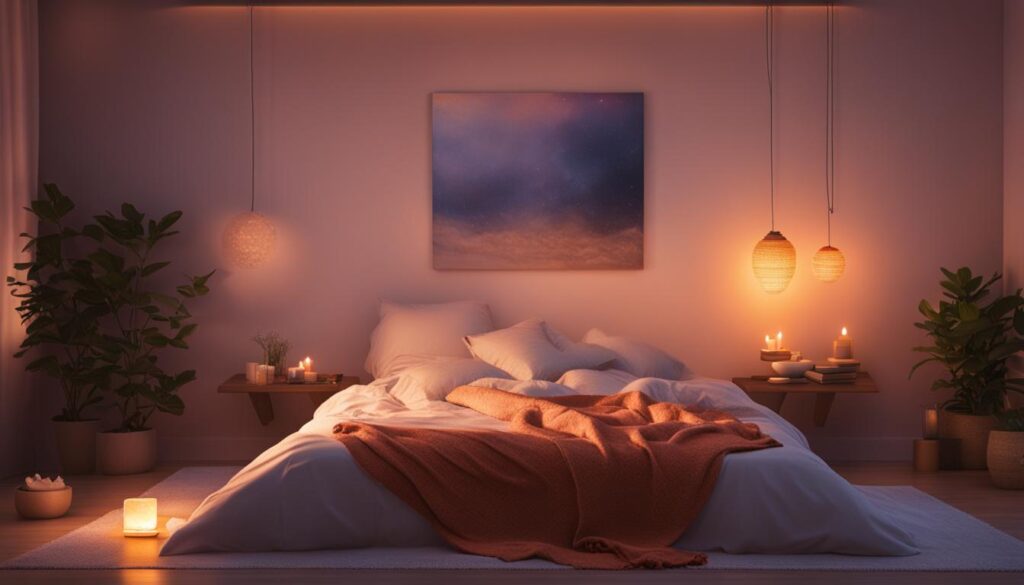Sleep is essential for overall well-being, but many Americans suffer from sleep deprivation. Lack of sleep can negatively impact attention span, mood, memory, and even lead to weight gain and mood problems. Meditation for sleep can be a powerful tool to improve sleep quality and promote restful slumber.
Key Takeaways:
- Meditation for sleep can help improve sleep quality and promote restful slumber.
- Sleep deprivation can negatively impact attention span, mood, memory, and lead to weight gain and mood problems.
- Guided sleep meditation techniques, such as guided visualization and progressive muscle relaxation, can aid in relaxation and promote deep sleep.
- There are various meditation techniques, such as mindfulness and body scan meditation, that can be incorporated into a sleep routine for better sleep.
- Meditation has been scientifically proven to improve sleep quality by balancing hormones and resetting the body’s natural circadian rhythm.
The Impact of Sleep Deprivation on Health
Sleep deprivation can have a significant impact on your overall health and well-being. When you don’t get enough sleep, it affects various aspects of your physical and mental health. One of the first areas to be affected is your attention span. Lack of sleep can make it difficult for you to focus and concentrate, leading to decreased productivity and performance.
Not getting enough sleep can also have a negative impact on your mood. Sleep deprivation often leads to irritability, moodiness, and increased stress levels. You may find yourself becoming more easily agitated or having difficulty managing emotions effectively. Additionally, sleep deprivation can impair your memory and cognitive function, making it harder to retain and recall information.
Another consequence of sleep deprivation is its effect on weight. Lack of sleep disrupts the balance of hormones that regulate hunger and appetite, increasing the likelihood of overeating and weight gain. In fact, studies have shown that people who consistently get less sleep tend to have a higher body mass index (BMI) and are at a greater risk of developing obesity-related conditions, such as diabetes and heart disease.
The Impact of Sleep Deprivation on Health – Table
| Effects of Sleep Deprivation | Description |
|---|---|
| Decreased attention span | Sleep deprivation impairs your ability to focus and concentrate, affecting productivity and performance. |
| Negative mood | Lack of sleep can lead to increased irritability, moodiness, and heightened stress levels. |
| Impaired memory and cognitive function | Sleep deprivation can make it harder to retain and recall information, affecting your overall cognitive abilities. |
| Weight gain | Lack of sleep disrupts the hormones that regulate hunger and appetite, potentially leading to overeating and increased weight. |
In conclusion, sleep deprivation has a profound impact on your health and well-being. It affects your attention span, mood, memory, and can contribute to weight gain. Recognizing the importance of quality sleep is essential for maintaining optimal physical and mental health. By prioritizing sleep and implementing healthy sleep habits, you can improve your overall well-being and live a more balanced life.
The Benefits of Guided Sleep Meditation
Guided sleep meditation is a powerful relaxation technique that can significantly improve sleep quality and promote deep, restful slumber. By incorporating guided visualization, progressive muscle relaxation, and guided breathing, this form of meditation helps relax the mind and body, creating a more conducive environment for a restorative sleep experience.
Guided Visualization
Guided visualization involves using the power of imagination to create a soothing mental image that promotes relaxation and prepares the mind for sleep. During this practice, you’ll listen to a calming voice as it guides you through vivid imagery, such as walking in a serene nature setting or lying on a tranquil beach. The focus on these peaceful scenes helps redirect your attention away from stress and anxiety, allowing your mind to gently drift into a state of deep relaxation.
Progressive Muscle Relaxation
Progressive muscle relaxation is a technique that involves systematically tensing and then releasing different muscle groups in the body. This practice helps release tension and promotes physical relaxation, which can be especially helpful for individuals who experience muscle stiffness or physical discomfort that interferes with sleep. By consciously relaxing each muscle group, starting from the toes and working your way up to the head, you can achieve a state of deep relaxation that prepares your body for a restful night’s sleep.
Guided Breathing
Guided breathing is a technique that focuses on slow, deep breaths to calm the mind and relax the body. By following the guidance of a meditation instructor or audio recording, you’ll be prompted to take slow, deliberate breaths in through your nose and out through your mouth. This rhythmic breathing helps activate the body’s relaxation response, reducing stress and promoting a sense of tranquility. Guided breathing can be especially beneficial for individuals who struggle with racing thoughts or anxiety that keeps them awake at night.
By incorporating guided sleep meditation into your bedtime routine, you can tap into its many benefits and improve your sleep quality. Whether you choose to focus on guided visualization, progressive muscle relaxation, or guided breathing, find the technique that resonates with you and practice it regularly. The consistent practice of guided sleep meditation can help create a sense of peace and relaxation, setting the stage for a restful and rejuvenating night’s sleep.
Table: Comparison of Relaxation Techniques
| Technique | Benefits |
|---|---|
| Guided Visualization | ✓ Reduces stress and anxiety ✓ Enhances mental relaxation ✓ Promotes positive imagery for sleep |
| Progressive Muscle Relaxation | ✓ Relieves physical tension ✓ Promotes physical relaxation ✓ Eases muscle stiffness |
| Guided Breathing | ✓ Activates relaxation response ✓ Calms the mind ✓ Reduces anxiety and racing thoughts |
How to Meditate for Better Sleep
When it comes to using meditation for better sleep, there are a variety of techniques you can incorporate into your sleep routine. Mindfulness meditation is one popular method that involves focusing on the present moment and letting go of racing thoughts. This can help calm your mind and prepare your body for sleep. To practice mindfulness meditation, find a quiet and comfortable space, close your eyes, and start by focusing on your breath. As thoughts arise, gently let them go and bring your attention back to your breath. Start with just a few minutes and gradually increase the duration as you become more comfortable.
Another technique that can be beneficial for sleep is body scan meditation. This practice involves systematically focusing your attention on different parts of your body, releasing tension and promoting relaxation. To try body scan meditation, lie down in a comfortable position and bring your awareness to your toes. Slowly move your attention up through each part of your body, paying attention to any areas of tension and consciously relaxing them. This can help release physical and mental stress, making it easier to fall asleep and stay asleep throughout the night.
In addition to mindfulness and body scan meditation, there are other types of sleep meditation that you can explore. Some people find guided sleep meditations helpful, as they provide a structured meditation experience with a narrator guiding you through relaxation techniques. Sleep meditations often incorporate soothing music or nature sounds, further enhancing the relaxation response. Experiment with different styles of meditation to find what works best for you and your sleep needs. Remember, consistency is key, so aim to incorporate meditation into your sleep routine on a regular basis for optimal results.
The Science Behind Meditation for Sleep
When it comes to improving sleep quality, meditation has a solid scientific basis. This ancient practice has been shown to have beneficial effects on various aspects of sleep, including the production of melatonin, regulation of cortisol levels, and synchronization of the circadian rhythm.
Melatonin, often referred to as the “sleep hormone,” is responsible for controlling the body’s sleep-wake cycle. Research has found that regular meditation can increase melatonin production, leading to quicker sleep onset and a more restful slumber. By engaging in meditation practices, you can help regulate this essential hormone and promote a healthier sleep pattern.
Cortisol, commonly known as the “stress hormone,” is associated with wakefulness and alertness. High cortisol levels can interfere with sleep and contribute to difficulty in falling asleep or staying asleep. Meditation has been shown to reduce cortisol levels, promoting a state of relaxation and tranquility that is conducive to a good night’s sleep.
The circadian rhythm is the body’s internal clock that regulates sleep and wake cycles. Irregularities in this rhythm can disrupt sleep patterns and contribute to sleep disorders. Meditation helps to reset the circadian rhythm by creating a sense of inner calm and balance. By practicing meditation regularly, you can align your body’s natural sleep-wake cycles and experience more consistent and restorative sleep.

Table: The Impact of Meditation on Sleep Quality
| Effect | Description |
|---|---|
| Increased melatonin production | Meditation promotes the production of melatonin, the hormone responsible for regulating the sleep-wake cycle. |
| Reduced cortisol levels | Meditation helps lower cortisol levels, reducing stress and promoting relaxation, leading to better sleep. |
| Improved circadian rhythm | Meditation helps reset the body’s internal clock, ensuring more consistent and regular sleep patterns. |
Tips for Incorporating Meditation into Your Sleep Routine
Creating a consistent sleep routine that incorporates meditation can greatly improve your sleep quality and overall well-being. By following these tips, you can establish a successful meditation practice and optimize your sleep schedule for a more relaxing environment.
Find the Right Time and Place
Choose a time that works best for you to incorporate meditation into your sleep routine. This could be in the evening before bed or even in the morning to start your day off on a calm note. Find a quiet and comfortable place where you can meditate without distractions. Creating a dedicated meditation space in your home can help you establish a routine and make it easier to focus.
Create a Relaxing Environment
Set the stage for a restful sleep by creating a relaxing environment in your bedroom. Dim the lights, adjust the temperature to a comfortable level, and reduce noise as much as possible. Consider using soothing scents, such as lavender, or playing calming music to enhance the relaxation experience. Keeping your bedroom clean and organized can contribute to a peaceful atmosphere and promote better sleep.
Incorporate Other Sleep Hygiene Practices
In addition to meditation, there are other sleep hygiene practices that can complement your sleep routine. Establish a regular sleep schedule by going to bed and waking up at the same time each day, even on weekends. Limit screen time before bed, as the blue light emitted by electronic devices can interfere with sleep. Instead, engage in calming activities like reading a book or taking a warm bath. Creating a relaxing nighttime ritual can signal to your body that it’s time to wind down and prepare for sleep.
By incorporating meditation into your sleep routine and practicing regularly, you can create a more peaceful and restful sleep environment. Remember to be consistent with your practice and be patient with yourself as you develop your meditation skills. With time, you’ll experience the benefits of improved sleep quality and wake up feeling refreshed and rejuvenated.


Conclusion
Meditation can be a powerful tool for improving sleep quality and promoting restful sleep. By incorporating meditation into your sleep routine and practicing regularly, you can experience the many health benefits of better sleep.
Consistency and patience are key when it comes to reaping the rewards of meditation for sleep. It may take some time to find the meditation techniques that work best for you, but the effort will be worth it.
Embrace the power of meditation for restful sleep. Make it a part of your daily routine and watch as your sleep quality improves, allowing you to wake up feeling refreshed and rejuvenated. Take the first step towards a better night’s sleep and start your meditation journey today.
FAQ
How does sleep deprivation impact our health?
Sleep deprivation can negatively affect attention span, mood, memory, and even lead to weight gain and mood problems.
What is guided sleep meditation?
Guided sleep meditation is a form of relaxation technique that can help improve sleep quality and promote restful slumber.
What are the different types of guided sleep meditation?
There are different types of guided sleep meditation, including guided visualization, progressive muscle relaxation, and guided breathing.
Can meditation improve sleep quality?
Yes, meditation has been scientifically proven to improve sleep quality by balancing the autonomic nervous system, regulating hormones like melatonin and cortisol, and resetting the body’s natural circadian rhythm.
How do I incorporate meditation into my sleep routine?
It’s important to find a consistent time and place to meditate, create a relaxing environment for sleep, and consider incorporating other sleep hygiene practices, such as establishing a regular sleep schedule and limiting screen time before bed.




